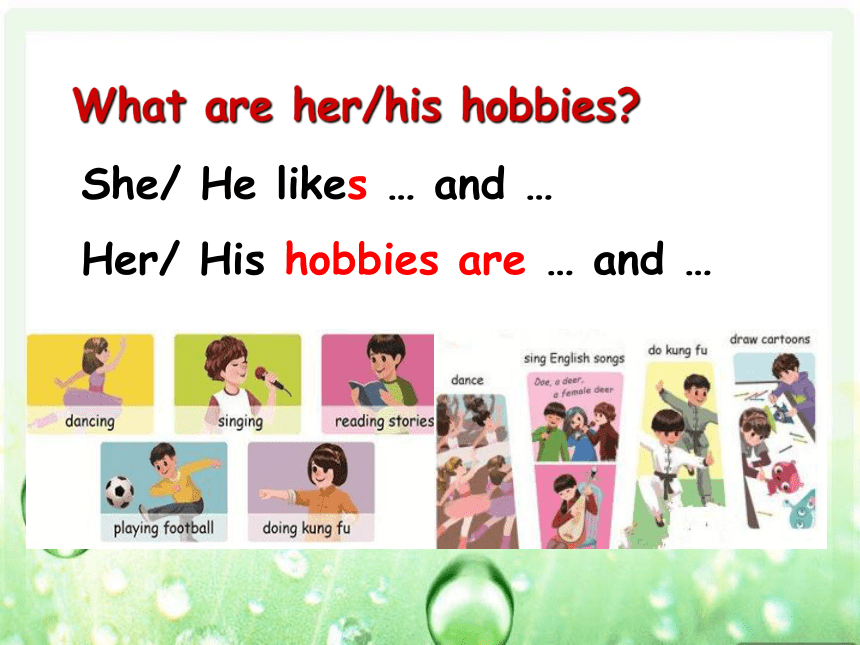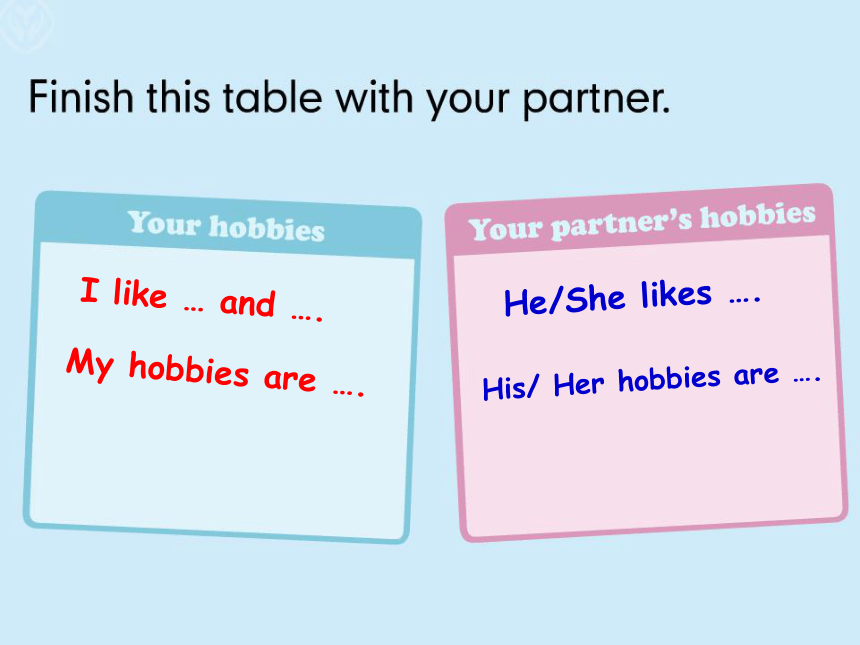Unit 4 I have a pen pal PB 复习课件
文档属性
| 名称 | Unit 4 I have a pen pal PB 复习课件 |

|
|
| 格式 | zip | ||
| 文件大小 | 2.9MB | ||
| 资源类型 | 教案 | ||
| 版本资源 | 人教版(PEP) | ||
| 科目 | 英语 | ||
| 更新时间 | 2018-01-01 00:00:00 | ||
图片预览









文档简介
课件22张PPT。Unit 4 I have a pen pal
Part BDoes your pen pal live in Shanghai?No, he doesn’t. He lives in Beijing.I (居住) in Beijing.He (居住) in Australia.livelivesWhat are her/his hobbies?She/ He likes … and …Her/ His hobbies are … and …I like … and ….My hobbies are ….He/She likes ….His/ Her hobbies are ….I like dancing!I like playing football!I like reading books.I like making robots.Different people have different hobbies!And sharing hobbies make us happier!Writing clubDancing clubComputer clubI want to share my hobby with you! Go to the Notice Board!Read, answer and write.1. Do the four people in the text want pen pals?
Yes, they do.
2. How many hobbies can you find in the text? Write them down.
Amy likes_______________________.
John __________________________.
Mike __________________________.
Robin__________________________. dancing
likes playing football
likes reading
teaches students to make robotsplay ---- playsgo ----_______goesjump ----_______jumpssing ----_______singshelp ----_______helpsdo ----_______doesstudy ----_______studiesteach ----_______teaches 阅读匹对1
2
3
4
5A
H
B
D
CUnderline the verbs and fill in the blanks.强调动词填空
Jane has a cat. The cat loves to sleep. Every afternoon Jane studies Chinese and does her homework. After that. Jane teaches her sister to draw. The cat just sleeps.
Let’s wrap it up①在一般现在时中,当主语为第三人称单数时,动词要用"s"型(即第三人称单数形式)。 ②所谓动词"s"型的构成,可按名词变复数的规则来记,即: 1)在动词尾直接加 s。如: play—plays, want—wants, work—works, know—knows, help—helps,get—gets love-loves
2)以字母s、x、ch或o结尾的动词加-es;如: guess—guesses, fix—fixes, teach—teaches, brush—brushes, go—goes,do—does,watch—watches,catch—catches 3)以辅音字母+y结尾的动词,先变y为i,再加-es。如: study—studies,carry—carries,fly—flies,worry—worries
4 )特殊情况
have的第三人称单数形式为has 。 一般现在时主语单三人称时的动词变化1、大多数动词在词尾加"s"在清辅音后发音为[s],在浊辅音及元音后发音为 [z]。如: stop-stops [s]; make-makes [s] read-reads [z]; play-plays [z]
2、以辅音字母加"y"结尾的,要先将"y"变为"i",然后在加"es"读[iz]。如: fly-flies [z]; carry-carries [z] study-studies [z]; worry-worries
3、以"s, x, ch, sh"结尾的,在词尾加"es",发音为[iz]。如: teach-teaches [iz]; watch-watches [iz]
发音规律4、以"o"结尾的动词,加"es",读[z]。如: go-goes [z]; do-does [z] 下面几个动词变为单数时,原词的元音部分的发音发生了较大的变化,请注意记忆。如: do [du:]-does [dz]; say [sei]-says [sez] 以不发音字母"e"结尾的开音节词,如果尾音是[s],[z]时,加"s"后字母"e"发音, 与所加"s" 一起读做[iz]。如: close-closes [iz]
发音规律livegowatchteachreaddoI Miss Liu (住)in Huangli. (去) to work on foot. ________(看)TV at night.________(教) English everyday. ______(读)newspapers everyday._____(做)housework at home.Mr. SmithHe live gowatchteachreaddoin England.to work by bus.TV in the morning.math everyday. magazines everyday.morning exercise
everyday.sesesesses1. There (be) a dance class on Sunday. 2. I like (dance) .3. Amy (need) a partner.4. Join (we) football club!5. see you on the playground! (否定句)6. My father (have) great books .7. We can ( share) .8. He (teach) students to make robots.dancingisneedsourhasshareteachesDon’t 按所给单词正确形式填空。找出下列句子的正确答语Does he live in China? Next Monday.
What are your hobbies? Yes, I can.
What are you doing? Singing and dancing.
Where does he live? I'm writing an e-mail.
Can you do kung fu? Yes, he does.
What are you going to do? He lives in Australia.
When are you going? I'm going shopping.Thanks!
Part BDoes your pen pal live in Shanghai?No, he doesn’t. He lives in Beijing.I (居住) in Beijing.He (居住) in Australia.livelivesWhat are her/his hobbies?She/ He likes … and …Her/ His hobbies are … and …I like … and ….My hobbies are ….He/She likes ….His/ Her hobbies are ….I like dancing!I like playing football!I like reading books.I like making robots.Different people have different hobbies!And sharing hobbies make us happier!Writing clubDancing clubComputer clubI want to share my hobby with you! Go to the Notice Board!Read, answer and write.1. Do the four people in the text want pen pals?
Yes, they do.
2. How many hobbies can you find in the text? Write them down.
Amy likes_______________________.
John __________________________.
Mike __________________________.
Robin__________________________. dancing
likes playing football
likes reading
teaches students to make robotsplay ---- playsgo ----_______goesjump ----_______jumpssing ----_______singshelp ----_______helpsdo ----_______doesstudy ----_______studiesteach ----_______teaches 阅读匹对1
2
3
4
5A
H
B
D
CUnderline the verbs and fill in the blanks.强调动词填空
Jane has a cat. The cat loves to sleep. Every afternoon Jane studies Chinese and does her homework. After that. Jane teaches her sister to draw. The cat just sleeps.
Let’s wrap it up①在一般现在时中,当主语为第三人称单数时,动词要用"s"型(即第三人称单数形式)。 ②所谓动词"s"型的构成,可按名词变复数的规则来记,即: 1)在动词尾直接加 s。如: play—plays, want—wants, work—works, know—knows, help—helps,get—gets love-loves
2)以字母s、x、ch或o结尾的动词加-es;如: guess—guesses, fix—fixes, teach—teaches, brush—brushes, go—goes,do—does,watch—watches,catch—catches 3)以辅音字母+y结尾的动词,先变y为i,再加-es。如: study—studies,carry—carries,fly—flies,worry—worries
4 )特殊情况
have的第三人称单数形式为has 。 一般现在时主语单三人称时的动词变化1、大多数动词在词尾加"s"在清辅音后发音为[s],在浊辅音及元音后发音为 [z]。如: stop-stops [s]; make-makes [s] read-reads [z]; play-plays [z]
2、以辅音字母加"y"结尾的,要先将"y"变为"i",然后在加"es"读[iz]。如: fly-flies [z]; carry-carries [z] study-studies [z]; worry-worries
3、以"s, x, ch, sh"结尾的,在词尾加"es",发音为[iz]。如: teach-teaches [iz]; watch-watches [iz]
发音规律4、以"o"结尾的动词,加"es",读[z]。如: go-goes [z]; do-does [z] 下面几个动词变为单数时,原词的元音部分的发音发生了较大的变化,请注意记忆。如: do [du:]-does [dz]; say [sei]-says [sez] 以不发音字母"e"结尾的开音节词,如果尾音是[s],[z]时,加"s"后字母"e"发音, 与所加"s" 一起读做[iz]。如: close-closes [iz]
发音规律livegowatchteachreaddoI Miss Liu (住)in Huangli. (去) to work on foot. ________(看)TV at night.________(教) English everyday. ______(读)newspapers everyday._____(做)housework at home.Mr. SmithHe live gowatchteachreaddoin England.to work by bus.TV in the morning.math everyday. magazines everyday.morning exercise
everyday.sesesesses1. There (be) a dance class on Sunday. 2. I like (dance) .3. Amy (need) a partner.4. Join (we) football club!5. see you on the playground! (否定句)6. My father (have) great books .7. We can ( share) .8. He (teach) students to make robots.dancingisneedsourhasshareteachesDon’t 按所给单词正确形式填空。找出下列句子的正确答语Does he live in China? Next Monday.
What are your hobbies? Yes, I can.
What are you doing? Singing and dancing.
Where does he live? I'm writing an e-mail.
Can you do kung fu? Yes, he does.
What are you going to do? He lives in Australia.
When are you going? I'm going shopping.Thanks!
同课章节目录
